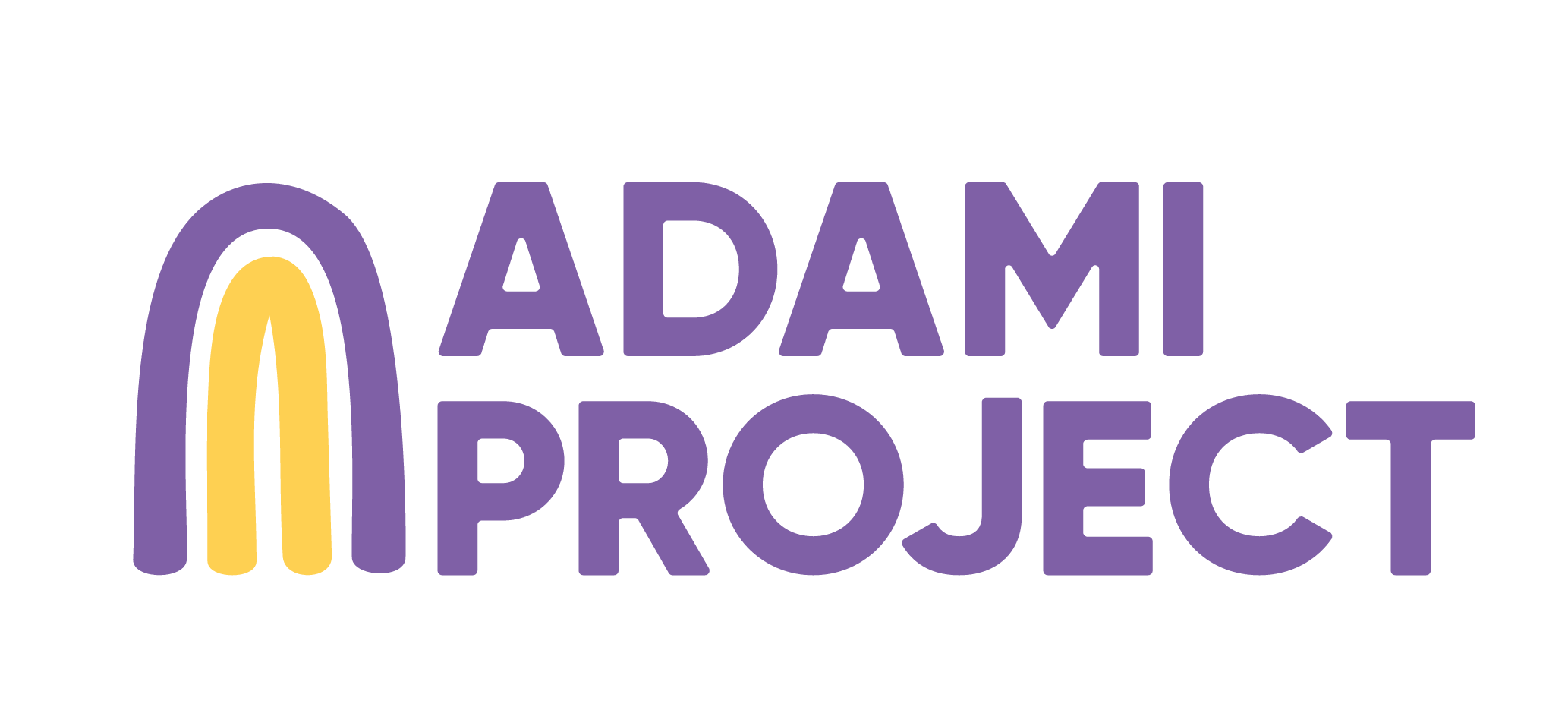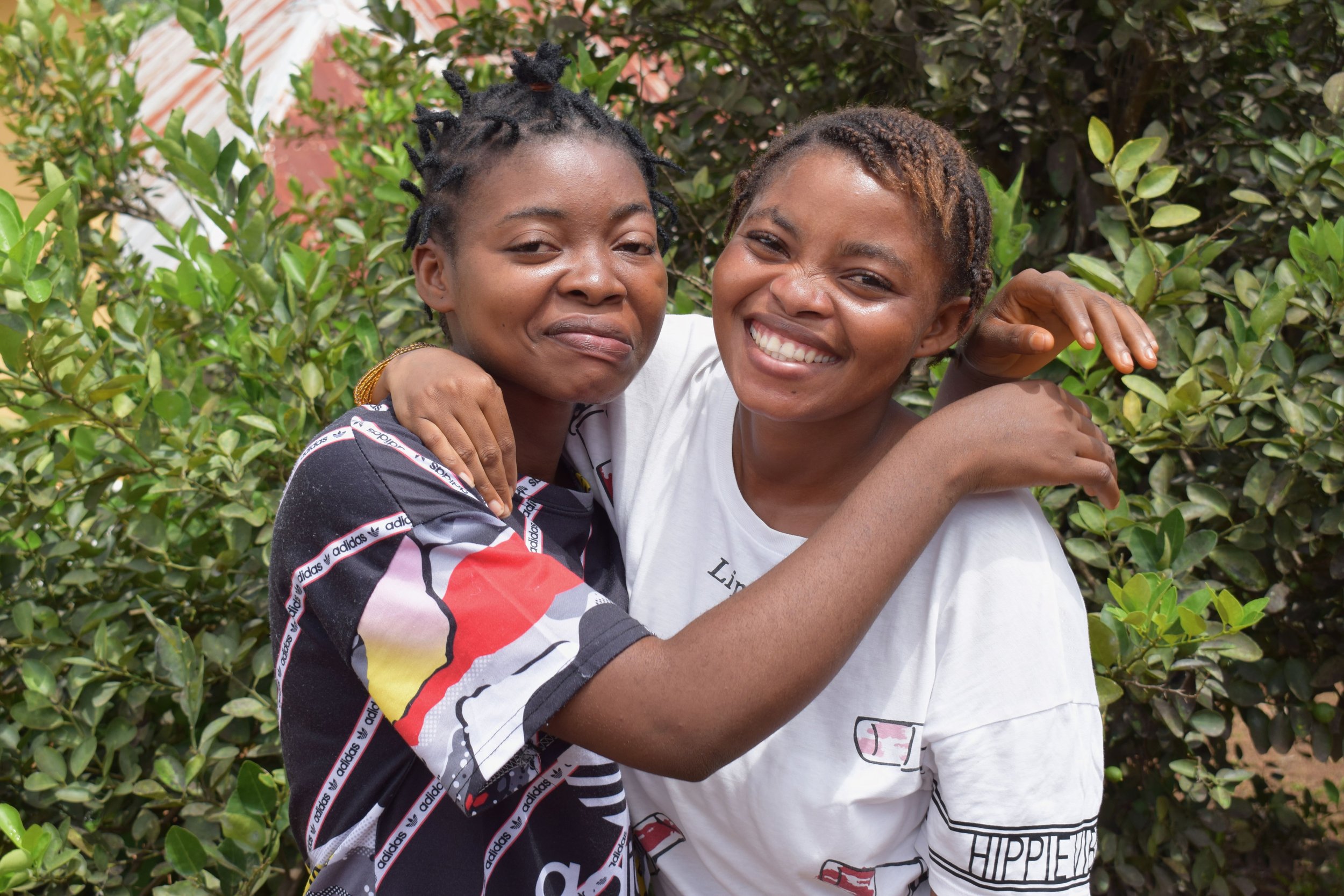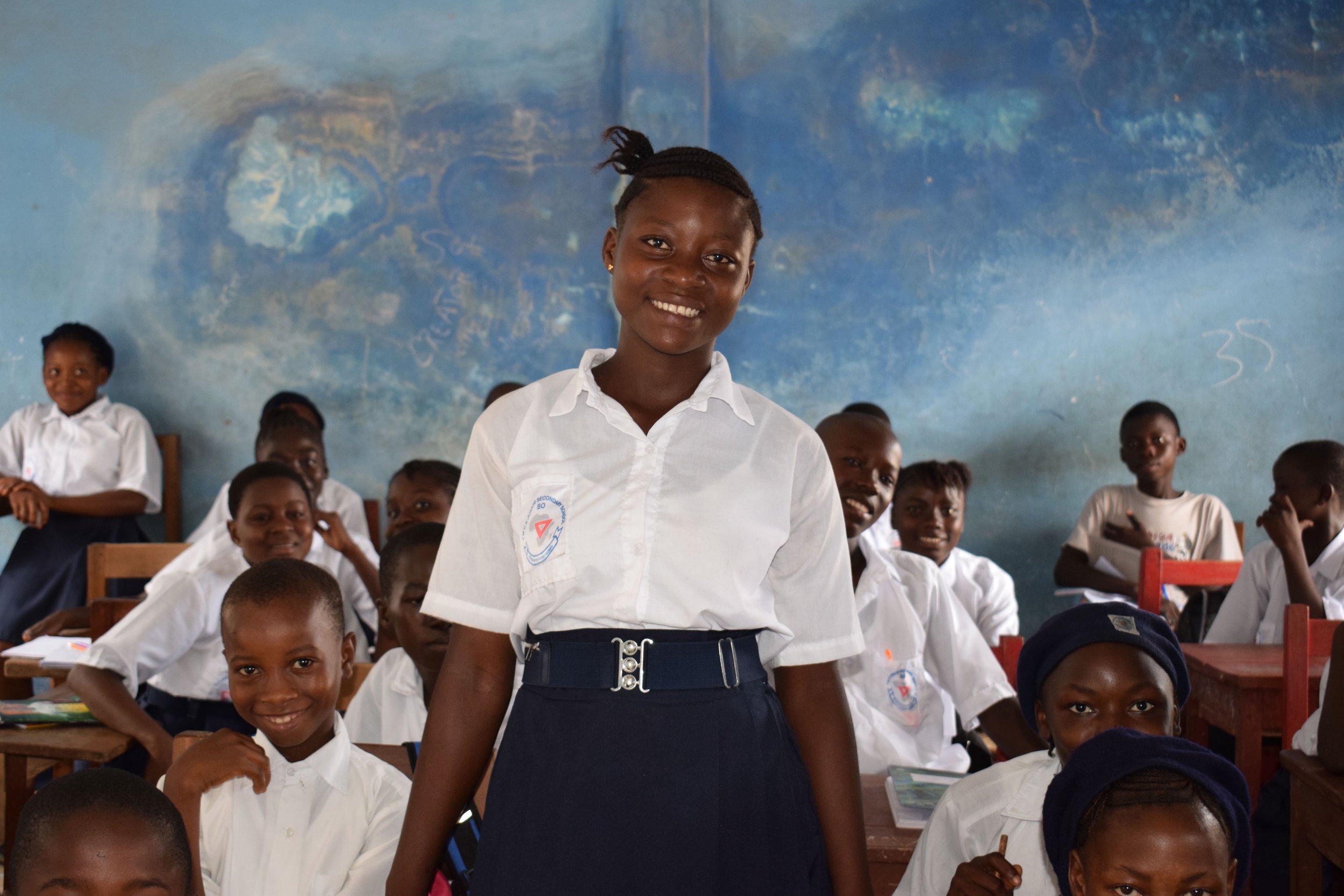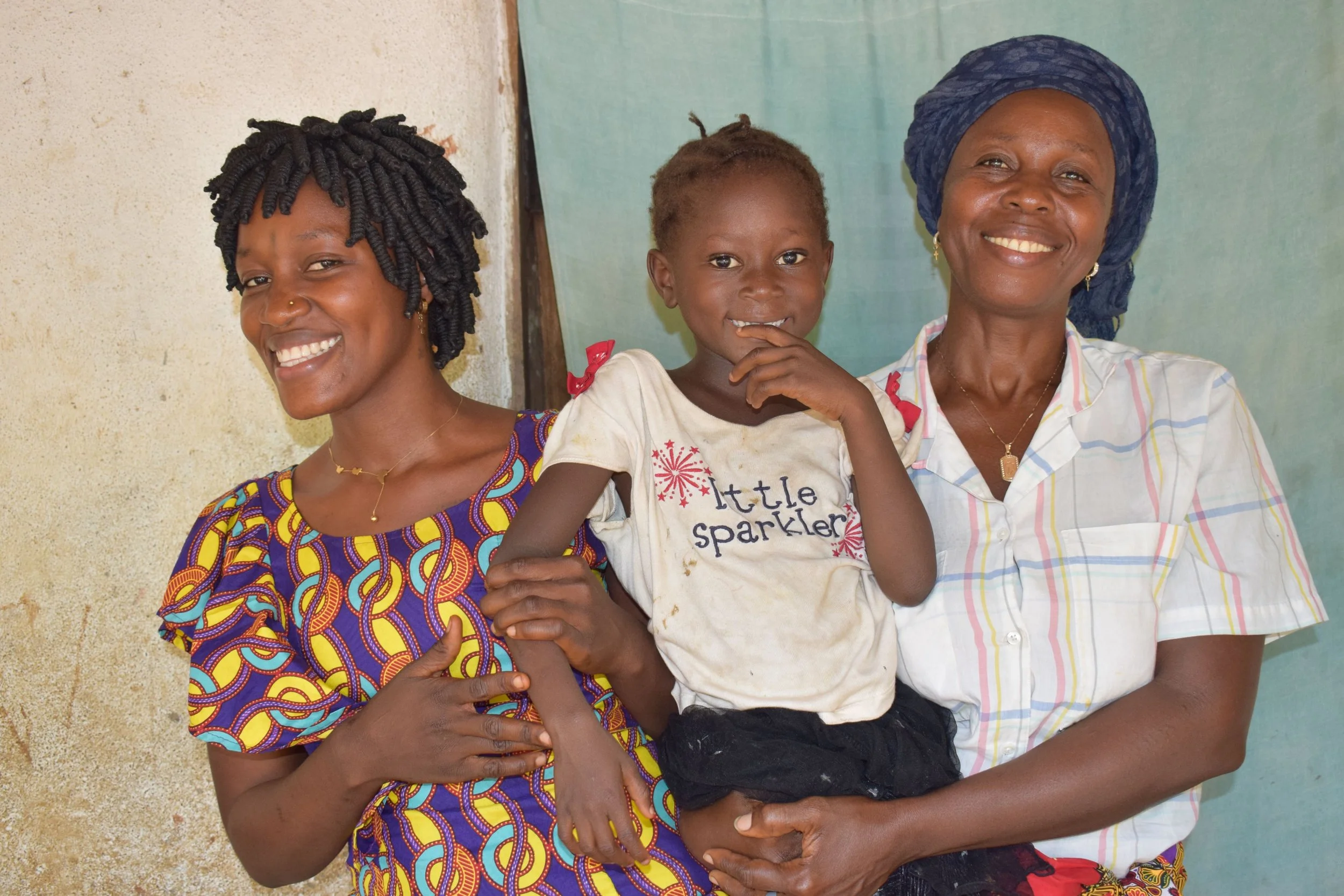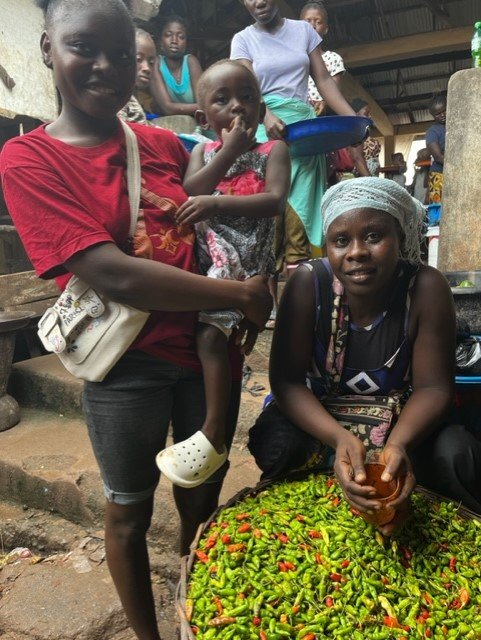October 2023 news
Adama, right, with Aminata. The sisters remain close
Celebrating five years of the AdAmi Project!
Did you know that it’s been five years since we launched the AdAmi Project? We started our pilot project with 25 young mothers in September 2018, testing and refining our project model over time to build it up to what it is today.
In September we caught up with Adama and Aminata, the inspiration behind the AdAmi Project (they are even our namesake - we took the first part of their names to come up with AdAmi’!). Sisters, Adama and Aminata fell pregnant within months of each other in 2017. At the time there was a nationwide ban on pregnant girls attending school and so, their education came to an abrupt end. Worried about how she would support two newborn children as well as her young nieces, their aunty drove them both out of the house.
Adama explained that at the time “I sat in the house pregnant as my friends passed by to go to school, everyone called me a dropout.” Both she and Adama had come to believe that their futures were over, that they would never be able to return to school again. But with the support of the AdAmi Project, their lives are now radically different, and their futures bright. You can read more about what they are up to here.
A young mother with her class in Bo
Back to school for the AdAmi girls
Schools and training institutions reopened across Sierra Leone at the start of September and so, our programme of activities are now back in full swing. This year, we are supporting approximately 135 young mothers through our tailored programme of support, with many more benefitting indirectly through wider complimentary activities, including family mediation support, caregiver business grants, family meals and the Community Girls Network.
Nancy at school
Meet Nancy, an AdAmi school scholar
Nancy has a wide smile and radiates positive energy. Composed and confident, it is easy to forget the struggles she has endured as a young mother of four year old twins.
Nancy was referred to the AdAmi team by a local school, whose social worker had become concerned about her disengagement at school and drop in grades. It quickly became clear that Nancy was struggling to juggle the demands of education and motherhood.
Whilst she was already enrolled at a local school, Nancy had become overwhelmed. Not only did she have nobody to help cover the costs of her schooling, such as uniforms and textbooks, but she also had a very limited support network and few positive role models in her life.
Since joining the project this summer, Nancy has been an active participant in our weekly life skills session which is “helping me to stand up and talk.” She and her social worker have also attended our monthly family meals, an initiative which brings families together to share their stories and experiences, and to offer each other support over a warm hearty meal.
Nancy is now in senior secondary school class 3 (SSS3), her final year of education, and is excelling; she was recently even appointed head girl based on her academic performance. Asked what advice she would give other young mothers she says “look at me and how my situation has changed. You too can achieve your dreams, just believe in yourself and chase them.”
Members of the Community Girls Network at their new centre
A new livelihoods centre for the Community Girls Network in Gondama
If you have been following our work closely over the past few years, you will know about the brilliant Community Girls Network, a grassroots movement created and led by the young mothers, and coordinated by our local partner MEANS.
Last year, we began giving unrestricted funding to the network to enable the young mothers to start testing new ideas and innovations. We felt this was key if we were to fulfil our commitment to being an organisation led by and for young mothers.
One of the key things that the young mothers in the Gondama community have been requesting is a safe and central space to call their own, where they can come together to have group meetings and also where they can participate in group livelihood activities.
MEANS and the network engaged with community leaders on the proposal, who responded positively and even gifted the network a free piece of land to the group to help them realise this ambition. A modest and airy local structure was subsequently built, which was officially opened in August. The building is now a hub of activity with many of the wider network members now engaged in training and income generating activities at the centre. This includes a core group of 10 young mothers who are receiving tailoring training with a local tailor (MEANS purchased three sewing machines and also hired a local tailor with our support). Some of our graduate tailoring students are also helping out. One of these is Baindu who, explaining why she is volunteering her time to the initiative says, “I want these young mothers to learn what I have been fortunate to learn.”
Tiangy (left) with her daughter Hannah and mother
Extension of our university scholarship programme
In 2021 we gave our first ever university scholarship to young mother Nasiratu, who is now in her final year of her finance and management degree. We are now excited to be able to offer a further four scholarships to young mothers who have completed their secondary education with us and who show great ambition and potential.
Our new scholars include Tiangay who was one of the first young mothers to join our pilot back in 2018. Tiangay is also one of the founders and leaders of her local Community Girls Network. Tiangay is due to start a degree in community development at Njala University later this month and, inspired by the work of her local mentors, plans to one day become a social worker. We will share Tiangay’s story on our blog very soon.
Building stronger and more resilient families through business grants
Batu, Jaminata’s mother, has one wish - for her daughter to finish her education and get a good job, so that she can live a better life. It’s a simple wish, but one that felt completely out of reach until Jaminata joined the AdAmi Project in 2021.
When Jaminata became pregnant her father drove her from their house. Blaming his wife for what had happened, her parents' relationship broke down, resulting in him marrying another woman. Not only was Jaminata homeless, she was also left with a deep guilt for the unjust treatment that her mother had endured at the hands of her father due to the pregnancy.
With the support of the AdAmi Project, Jaminata was enrolled back into school. Her mother, who agreed to care for her son whilst she attended school, also received a business grant in return for this help. Batu used the grant to buy food items for her market stall in a hectic and vibrant food market tucked away at the end of a dusty road in Bo town. Her stall is a popular spot where people buy hot pepper (chili's) and other basic food items used to make popular local dishes such as cassava leaf and groundnut soup.
Jaminata’s mother explains that the business grant has really helped her to grow her business and to generate extra profit, which she is using to care for Jaminata and her grandson. She has also found the savings scheme very helpful, encouraging her to save for the first time. She recently saw the benefit of this, when she was able to use her savings to pay for her grandchild’s hospital treatments.
A life skills session in action - each week, the young mothers take turns to open the session
Building confidence through life skills
“A problem shared is a problem halved, and this is why the life skills sessions are so effective”, explains AdAmi’s local social worker Andreta, who has been working with us since 2021. “As well as teaching the girls critical life skills, the sessions give the young mothers a sense of belonging, where they can find the support and encouragement of others.”
The weekly life skills sessions are a critical element of our project, and all young mothers are required to attend sessions at the local AdAmi office on a weekly basis. The sessions are also a great way to check-in with the young mothers to ensure they are doing well on the programme and that they do not have any concerns. Andreta says ‘the sessions really make the project unique and through these regular meetings the young mothers have become like sisters to each other.’
A full schedule of life skills sessions resumed at the start of September at the AdAmi office in Bo.
